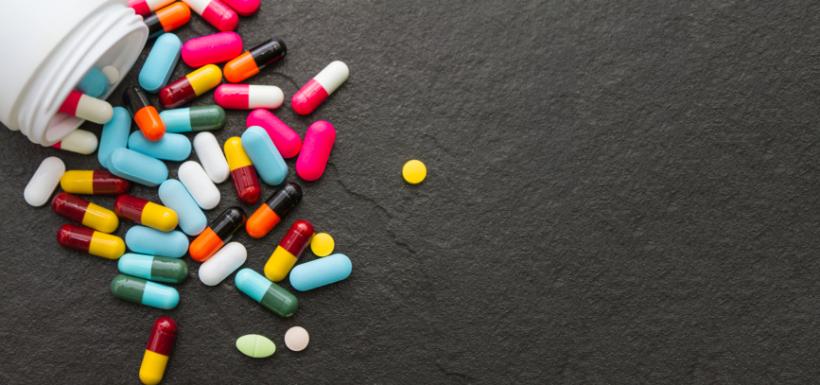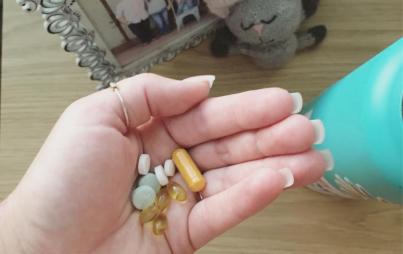
Colorful pills spilling out of a bottle.
I’m not immune to society’s negative perceptions of folks with mental illness and the difficult choices that we make.
When my psychiatrist suggested coming off of one of my medications for bipolar disorder, it felt like an accomplishment.
Even though I knew logically that being on these meds didn’t say anything about my character, deep down I had always hoped that maybe one day I could stand on my own two feet and not have to rely on pills to keep me sane.
I think I had internalized this idea that psychiatric medications are only given to weak people; that our inability to cope was our own fault and that medications were our punishment. It’s a terrible thought, but it’s a prevalent one.
When the doc said that we could explore the possibility of being on less medication, I was thrilled. It felt like I was being rewarded for all of the hard work I had done in the last few years. After all, I was a functional adult now and not the same suicidal, self-destructive teenager that had led to this particular drug cocktail.
I was reformed. I could handle myself now. I wasn’t like those people.
Yikes.
The truth is, even as an outspoken mental health advocate, I’m not immune to society’s negative perceptions of folks with mental illness and the difficult choices that we make.
I’ve dealt with a lot of guilt and shame around being medicated. I’ve worried that I just wasn’t trying hard enough to be well. I’ve wondered if taking medications makes me weak, inferior, or broken.
So I jumped at the chance to taper off of a medication, even though deep down I had my doubts that I could still be healthy with very little medicine. And as desperately as I’d wished that my hesitations were ill-founded, they weren’t: As I came down from my mood stabilizer, my mood, predictably, became unstable.
Real talk: Bipolar disorder is a finicky asshole. I’m in awe that simply altering the dose of one medication made me feel like a literal stereotype. I don’t like to play into typical attitudes about this disorder, but when I had this chemical shift, I was suddenly crying about nothing one minute and exhilarated and ecstatic the next.
It would be really comedic if it weren’t so distressing. An example: I was trying to make myself lunch — veggie dogs and baked beans, to be more specific. My partner moved my pot of baked beans to another stove burner, making it difficult for me to reach from where I had been standing. So I snapped, yelling about how inconsiderate and “thoughtless” it was. Then I stormed off to my bedroom in a huff.
And then I cried about it.
Somehow taking two less pills a day has turned me into an actual child who sobs about…baked beans?
You would think that this instability would prompt me to call my psychiatrist immediately. Not so. I kept thinking that I could handle this, that I was “better” now and that I should be more capable of adapting. I was more resilient than I was when these pills first came into my life.
Why couldn’t I just keep it together?
I felt deeply ashamed that I had been unable to adapt. I felt like a failure. Going back to my previous medications felt like admitting defeat — and so, for weeks, I was back on the bipolar roller coaster and subjecting everyone in my life to the drama that goes with it.
This is more than being stubborn (though make no mistake about it, people in my life will attest to just how stubborn I really am). This is about buying into the idea that taking medications for a psychological disorder is somehow a failure on our part. Instead of it being a health issue it has somehow become a reflection of our own inferiority.
Let me tell you: I felt like garbage, but I insisted on fighting myself on it because I thought that taking less pills somehow made me a better person. And while I logically understood this to be untrue, these are the messages that we receive because society likes to shit on folks who rely on these medications to survive.
Whenever I thought about picking up the phone and giving my psychiatrist a call, I could hear the family members who asked me, “When do you think you’ll be well enough to stop taking pills for this?”
Whenever I considered going back to my original dosages — a combination that was working so exceptionally well and gave me a real quality of life that took years to accomplish — I could hear the friends who would say to me, “You could just exercise or eat better, I’m sure that would make a real difference.”
When I contemplated taking back control of my life, I remembered all of the subtle and even overt ways that society liked to police my personal health decisions by suggesting that I was somehow less than for taking a medication that had saved my life.
And so I waited, telling myself that I could deal, telling myself that I was doing the right thing by toughening up and weathering the storm, insisting that I was “better than this.”
It got me thinking about the ways that we endanger the lives of people with mental illness by shaming them for making tough but important decisions that help them to reclaim their lives and their health.
When we make medications seem like a failure rather than a simple necessity, we make the people who take them feel like failures, too. And ultimately that discourages us from doing what we need to do to be well.
I remember a time when I was struggling to access mental health care. I remember fighting tooth and nail to get medications so I could finally know what it felt like to be well. And more than anything, I remember the strength it took to make such a difficult decision for myself.
While some might point to my reliance on medication as a personal failing, the reality is that I wouldn’t be here without them — and choosing to live and live well is never a failing, but rather, an incredible act of courage.
Now if you’ll excuse me, I’ve got a phone call to make.






